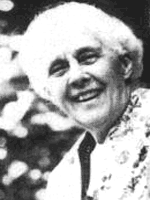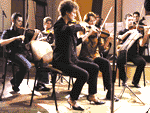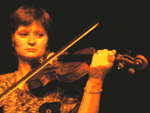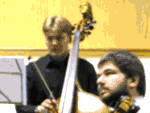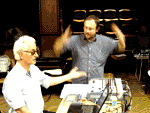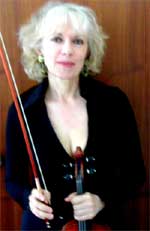 | |||||||

|
charlie's whiskers ten palindromes for charles ives for strings, solo violin, piano, saw, interactive bow, and live sampling |
|
Commissioned by Daniel Matej for Evenings of New Music, Bratislava, 2004. Programme notes for Charlie's Whiskers. In 1989 I was invited to be artistic director of The Relative Violin Festival in Berlin - part of the annual Inventionen, a new music extravaganza. While working on the catalogue, the New York conceptual artist Barbara Bloom presented us with a wonderful image entitled Paganini: Din in a gap - the perfect visual palindrome for such a musical event. From Bach to Berg, palindromes are common in music. Most students practise them every day in the form of scales and arpeggios. For me they have a special place as pointers to my long time obsession with the notion of duality - the (often reductive) methodology with which our species tends to view the world and itself. For this commission, I have constructed a series of palindromes. Sometimes the palindrome is concerned solely with pitch, sometimes with rhythm, and sometimes all aspects of the musical material are treated palindromatically. As with most of my output, Charlie's Whiskers looks at string players and string playing and proposes other contexts and collisions for the mainstays (or should that be mainslaves?) of European culture. My homage to Ives in this piece is apparent in three ways. Firstly, Ives was one of the first composers who dared to allow independent musical processes to exist in the same sonic environment or on the same stage. In many of his works, folk songs, marching bands, fireworks, distant choirs, collide in happy sonic collage - the world how it really is (Percy Grainger also realised this truism at the beginning of the 20th century in his piece The Warriors). In Charlie's Whiskers, up to four Palindromes are to be heard in the same space - each in their own time/space continuum. Secondly, Ives, although a lover of late 19th-century rural New England life, is arguably the first industrial composer; he may have been shy and conservative as a social being, but he was a very noisy bloke! He enjoyed the busy processes of humanity going on all around him; he liked to improvise, and he enjoyed the mass and the mess of America as it became the giant of the twentieth century. The energy and complexity in his music is still confronting. In my mind, I often link Thomas Edison with Charles Ives. Ives wrote at length promoting democratic principles, and the invention of democratic electricity was probably the biggest social advance that happened in Ives' lifetime. Along with electricity came the age of recording. At first considered little more that a novelty as the inventor shouted "Mary had a little lamb" onto wax and into posterity, recording has by the beginning of the twenty-first century pushed the function and practice of live music into an exotic corner - if not to the edge of extinction. Ives entered the recording studio only four times. He used it to try out his compositions, experiment with them, and improvise around the material. Since, with the exception of Nicolas Slominsky, few were interested in actually performing his music, a recording studio offered this maverick some sort of feedback. Between 1933 and 1943, Ives made 42 takes from 17 different compositions. All in all, it's a wild collection and gives a glimpse of his creative process. From time to time you will hear snippets of his piano playing in this homage - look out too for his unrestrained singing! Thirdly, you can't get a more inspirational figure than Charles Ives. No matter how hard you may think it is getting new music into the public arena, this guy never heard a complete performance of his massive orchestral compositions played. Only after Ives stopped composing in 1921 did he gain a reputation with the younger avant-garde; Henry Cowell was the energetic conduit for this belated process. Although Ives had a great sense of humour and irony; to keep going under circumstances of almost total public neglect shows that he had a dogged belief beyond compare (including Beethoven with his hearing disability). Lastly, there is a personal connection to the Ives' dynasty. The solo violinist in tonight's performance, Hollis Taylor, directs a string quartet in Oregon, USA. The cellist in that group, Nancy Ives, is Charles' grandniece. You might say - a chop off the old block. "Are my ears on wrong?" asked Charles Ives. "I'm the only one, with the exception of Mrs. Ives (and one or two others), who likes any of my music, except perhaps some of the older and more or less conventional things. Why do I like these things? Why do I like to work in this way and get all set up by it, while others only get upset by it and it just makes everybody else mad?" And on that sane note, I'll close. Jon Rose The Bratislava Chamber Soloists were formed in 1990 by students at Bratislava's Academy of Music and Drama. Romantic and Classical music provides most of the repertoire, but twentieth-century works from composers such as Górecki, Satie, Schnittke, Andriessen, Krauze, Pärt, Vladimír Godár, Rajter and Peter Zagar also account for a substantial part and the ensemble has given first performances of numerous works by Slovak composers. The Bratislava Chamber Soloists perform regularly at major music festivals in Japan, Germany, Spain, the Czech Republic, Poland, Belgium, Switzerland, Ukraine, and Austria. Its appearance at the Prague Spring Festival proved to be an important milestone and it was followed by invitations to other important venues. The ensemble has recorded soundtracks for several Slovak and Czech films. The ensemble works with Slovak, Czech and Austrian state radios, with the Slovart Music and Christophotus labels. Hollis Taylor violin Ivan Siller piano Jon Rose saw, electronics Marián Lejava conductor Beáta Rasková violin Lucia Mlynáriková violin Daniel Tursina violin Iveta Blasejová violin Peter Mosorjak violin Stanislav Palúch violin Margaréta Benková piano Alexander Lakato viola Peter Zwiebel viola Boris Bohó cello Vladimír Sirota cello Peter Jursenko double bass Frantisek Macha double bass A special thanks to Emmett Williams and Clementine Thomas for the archival recordings of Mr. and Mrs. Ives Daniel Matej festival producer, director and fixer Roman Lasciak recording |
 |
